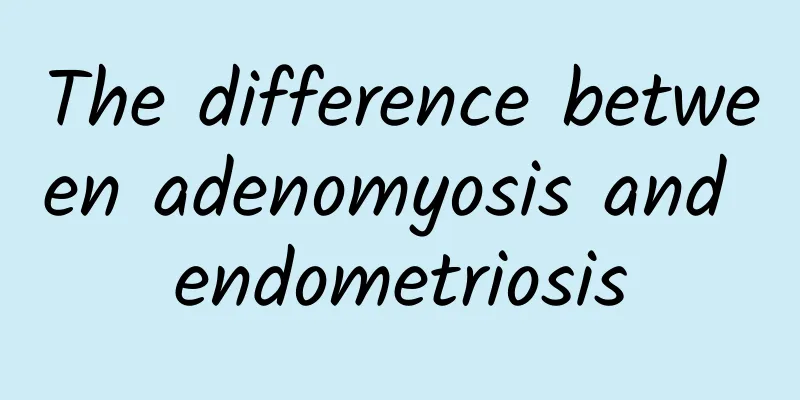The difference between adenomyosis and endometriosis

|
Adenomyosis and endometriosis are two different gynecological diseases, and the treatment methods vary depending on the cause. Adenomyosis is the invasion of endometrial tissue into the myometrium, causing uterine enlargement and dysmenorrhea; endometriosis is the growth of endometrial tissue outside the uterus, such as in the ovaries and fallopian tubes, causing pain and infertility. Treatment includes medication, surgery and lifestyle adjustments. 1. Treatments for adenomyosis include medication, surgery, and lifestyle adjustments. Medication commonly used include nonsteroidal anti-inflammatory drugs such as ibuprofen, hormonal drugs such as oral contraceptives, GnRH agonists, and Chinese medicine conditioning. Surgical treatments include uterine artery embolization, hysterectomy, and endometrial ablation. Lifestyle adjustments recommend maintaining a regular schedule, moderate exercise, and a balanced diet, and avoiding excessive fatigue and mood swings. 2. Treatments for endometriosis also include medication, surgery, and lifestyle adjustments. Medication commonly used include nonsteroidal anti-inflammatory drugs such as naproxen, hormone drugs such as oral contraceptives, progesterone, and Chinese medicine conditioning. Surgical treatments include laparoscopic surgery, ovarian cystectomy, and hysterectomy. Lifestyle adjustments recommend maintaining a regular schedule, moderate exercise, and a balanced diet, and avoiding excessive fatigue and mood swings. 3. The cause of adenomyosis is mainly related to the invasion of endometrial tissue into the myometrium, which may be caused by factors such as genetics, abnormal hormone levels, and a history of uterine surgery. The cause of endometriosis is mainly related to the growth of endometrial tissue outside the uterus, which may be caused by factors such as retrograde menstruation, abnormal immune system, and genetics. 4. Symptoms of adenomyosis include dysmenorrhea, heavy menstrual flow, pain during sexual intercourse, and infertility. Symptoms of endometriosis include dysmenorrhea, chronic pelvic pain, pain during sexual intercourse, and infertility. The symptoms of the two are similar, but the causes and treatments are different. 5. The diagnosis of adenomyosis is usually made through ultrasound, magnetic resonance imaging, and hysteroscopy. The diagnosis of endometriosis is usually made through ultrasound, magnetic resonance imaging, and laparoscopy. Early diagnosis and timely treatment are crucial to improving prognosis. Adenomyosis and endometriosis are two different gynecological diseases, and the treatment methods vary depending on the cause. Early diagnosis and timely treatment are crucial to improving prognosis. Patients are advised to choose appropriate treatment plans according to the doctor's advice and pay attention to lifestyle adjustments to relieve symptoms and improve quality of life. |
<<: What is the cause of endometrial thickness after years of amenorrhea?
>>: Is it easy to treat anemia caused by uterine fibroids?
Recommend
Red food is in short supply, eat seasonal fruits first
In the cold wind, eating more red foods can enhan...
Which fat-reducing tea is suitable for apple-shaped and pear-shaped obesity? Chinese medicine practitioners say...
Modern people eat greasy food and are too lazy to...
Which hospital should I go to for grade 3 cervical precancerous lesions?
A regular hospital for the treatment of diseases ...
Analysis of common causes of cervical erosion
As women pay more attention to their health, many...
Taking Chinese medicine can cure cervical erosion
Taking Chinese medicine can cure cervical erosion...
Common surgical methods for uterine fibroids What are the hazards of uterine fibroids surgery?
Uterine fibroids are a gynecological disease that...
How to judge whether uterine fibroids are malignant? What should I do if I have uterine fibroids?
Uterine fibroids are one of the most common benig...
Will a woman's sex life be affected if she has had surgery for Bartholinitis?
Can women still have sex if they suffer from Bart...
Hong Tae-woong uses the "cup and bowl palm" weight loss method again
Hung Tai-hsiung, director of the registration gro...
Lose weight and don’t gain it back! Supplement protein to increase basal metabolism
Obesity is a disease that requires diet and exerc...
Is Bartholinitis Dangerous?
Bartholinitis is a gynecological disease that oft...
Is surgery necessary for the treatment of endometrial tuberculosis?
Western medicine focuses on the use of antibiotic...
Vaginitis is not a small matter, it is important to understand the symptoms
Vaginitis is a common gynecological infectious di...
What are the causes of vaginitis?
What are the causes of vaginitis? If vaginitis is...
Symptoms of severe cervical erosion
Because there are no obvious symptoms in the earl...









